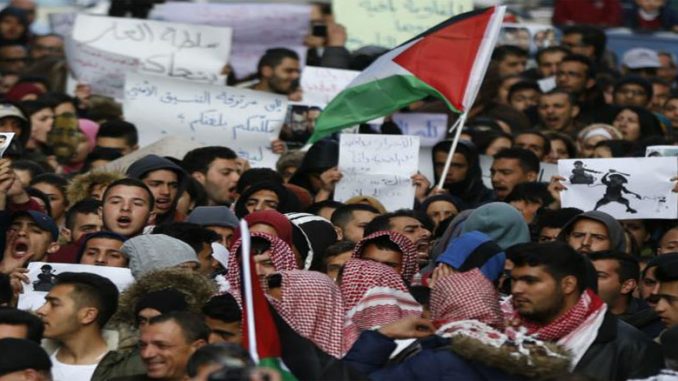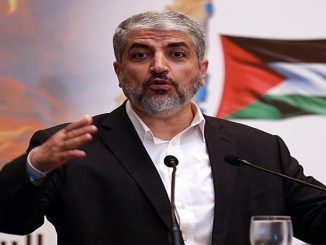
The occupied West Bank-based Palestinian Authority (PA) announced on Tuesday that it had decided to push more than 6,000 civil servants from the besieged Gaza Strip into early retirement, the latest move in an increasingly bitter feud between the Hamas movement and the Fatah-led PA.
In a statement, PA spokesman Yousif al-Mahmoud said that the decision — which would affect some 6,145 public sector employees — as well as “previous procedures and any possible future procedures in this regard” were only temporary moves seeking to pressure Hamas, the de facto ruling party in Gaza, into relinquishing its control over the small coastal enclave and reconciling with the PA.
Reconciliation, al-Mahmoud added, should be achieved through PA President Mahmoud Abbas’ plan, which calls for the dissolution of Hamas’ “administrative committee” ruling the Gaza Strip, the implementation of a national consensus government with full sovereignty over Gaza, and a roadmap for general elections across the occupied Palestinian territory.
The spokesman stated that the PA pledged in its weekly cabinet meeting on Tuesday to cancel all of its procedures if Hamas “retracted” its own moves against the PA.
“Hamas has been collecting hundreds of millions of shekels every month and does not return them to the public treasury, while the (PA) government allocates more than 450 million shekels ($128 million) to the southern districts (Gaza Strip),” al-Mahmoud said, reiterating PA accusations levied against Hamas in recent months.
The Palestinian Information Center news site quoted a Hamas spokesman as saying that the PA was “implementing PA President Mahmoud Abbas’ orders to impose extreme punishment on the Gaza Strip.”
Numerous attempts have been made in the past to reconcile Hamas and Fatah since they came into violent conflict in 2007, shortly after Hamas’ 2006 victory in general elections held in the Gaza Strip.
However, Palestinian leadership has repeatedly failed to follow through on promises of reconciliations, as both movements have frequently blamed each other for numerous political failures.
The PA itself has been the focus of fierce condemnation in recent months after being accused of deliberately sending the impoverished Gaza Strip further into a humanitarian catastrophe in order to wrestle control of the territory from Hamas.
The PA caused anger in Gaza in April after cutting salaries to its Gaza-based employees by up to 30 percent, while also deciding to discontinue payments to some 277 former political prisoners of Israel, with reports indicating that the move targeted former prisoners in Gaza and those affiliated with Hamas in the West Bank.
In May, the PA decided to slash funding for Israeli fuel to the coastal enclave, as Israeli authorities acceded to PA demands to dramatically reduce its electricity supply to Gaza, which was already reeling from lack of adequate access to electricity and fuel.
Other policies implemented by the PA in recent weeks, including allegedly halting medical referrals to patients in Gaza to receive medical treatment outside of the territory and cutting its funding to the medical sector in the besieged enclave, which has seen the typical $4 million monthly budget of Gaza’s health ministry plummet to just $500,000, have also greatly exacerbated the dire situation of residents in Gaza.
The PA also decided last month to block 11 Palestinian news websites — all allegedly affiliated with either the Hamas movement or Muhammad Dahlan, a political rival of Palestinian President Mahmoud Abbas, which has been condemned by rights groups as a “serious violation of freedom of the press and expression.”
In addition to withholding funds collected in Gaza, Hamas authorities have also been accused of targeting Fatah officials in Gaza through detentions and restricting their freedom of movement, most recently preventing a Fatah Central Committee member from leaving the besieged territory on Saturday.



